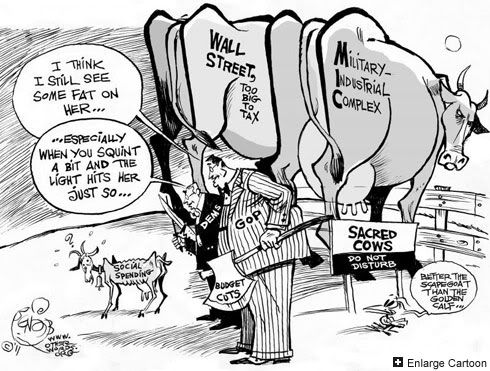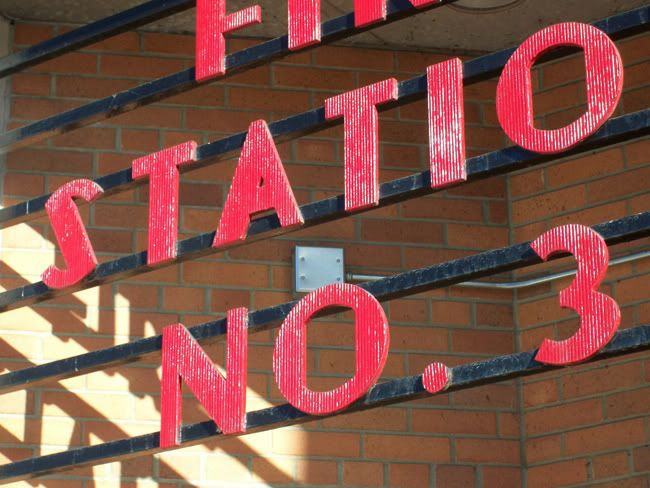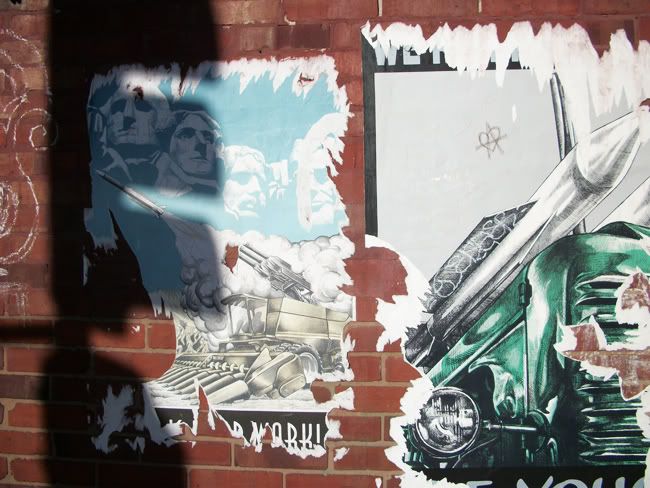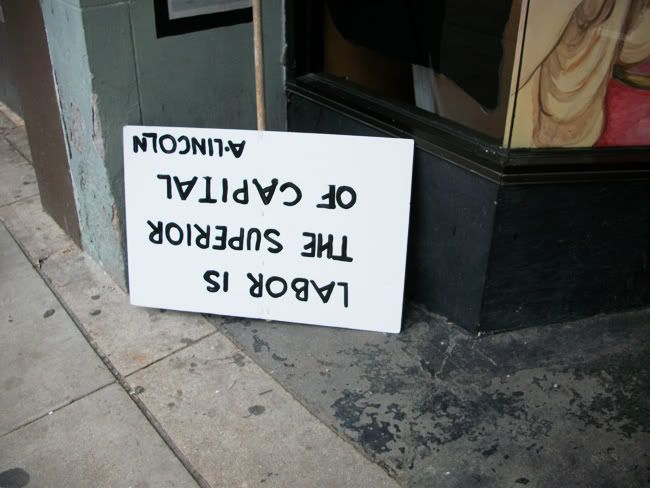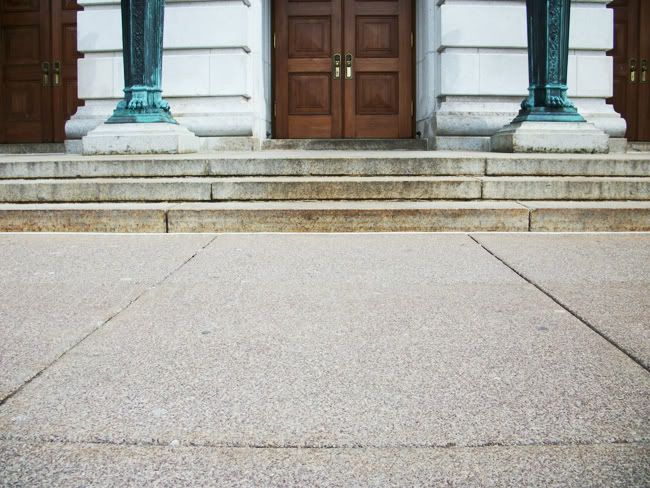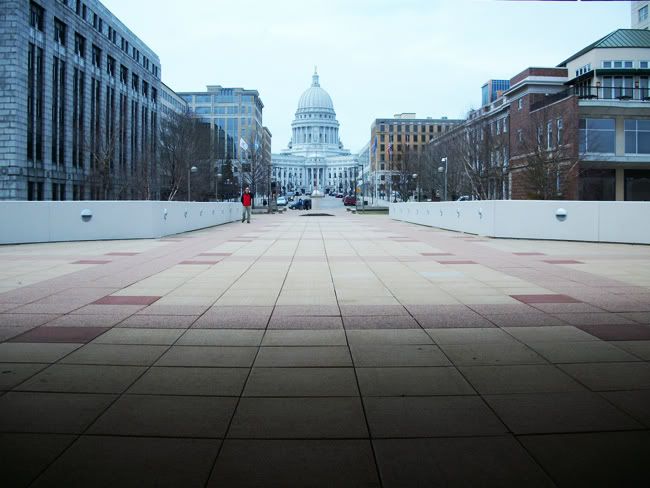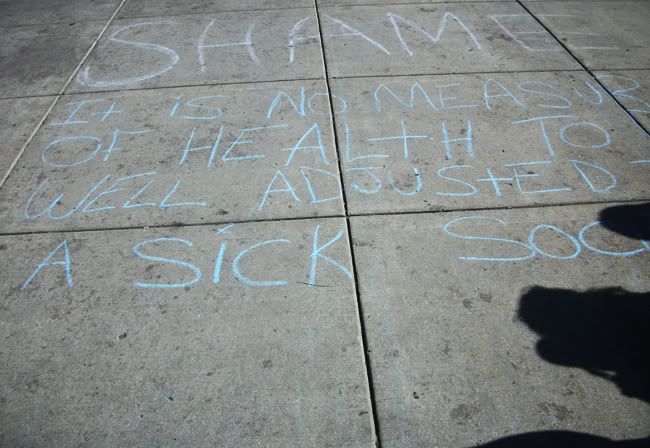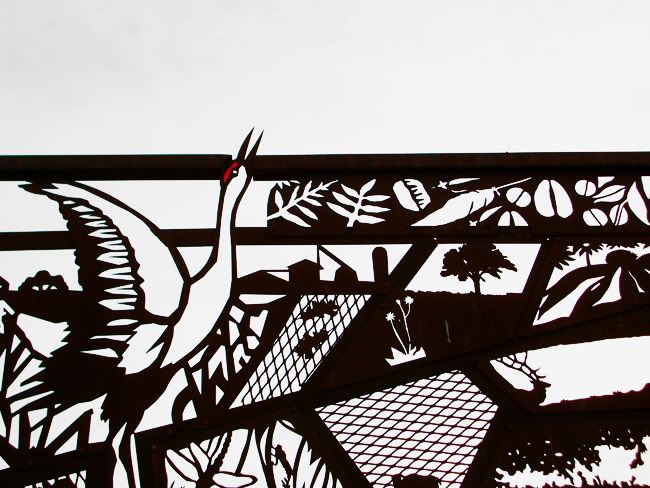Tuesday, March 29, 2011
Rewind.
Monday, March 28, 2011
Sunday, March 27, 2011
Mahi mahi.
- 3 Tbsp. brown sugar
- 4 Tbsp. water
- 3 Tbsp. soy sauce
- 1 Tbsp. balsamic vinegar
- 2 tsp. grated fresh ginger root
- 2 cloves garlic, crushed
- 1 tsp. olive oil
- 24oz raw mahi mahi fillets
- salt and pepper to taste
- In a shallow glass dish, stir together the sugar, water, soy sauce, balsamic vinegar, ginger, garlic and olive oil. Season fish fillets lightly with salt and pepper, and place them into the dish. Cover, and refrigerate for 20 minutes to marinate. Preheat broiler. Remove fish from the dish, and reserve marinade. Place fish on a baking tray and broil 4 to 6 minutes on each side, turning only once, until fish flakes easily with a fork. Remove fillets to a serving platter and keep warm. Pour reserved marinade into the skillet, and reduce until the mixture reduces to a glaze. Spoon glaze over fish, and serve immediately.
Friday, March 25, 2011
We'll see.
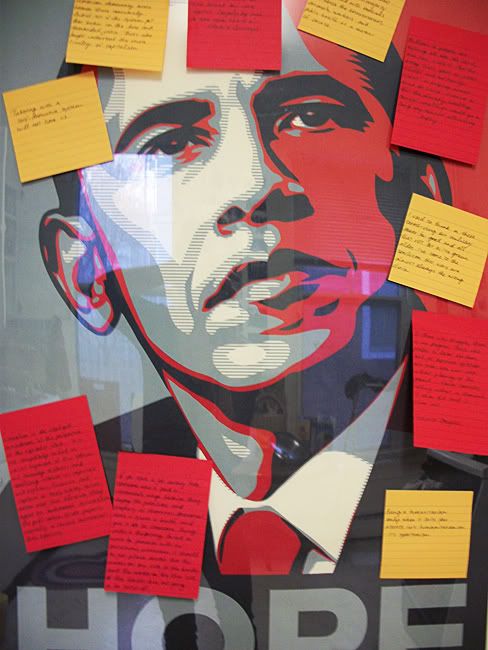
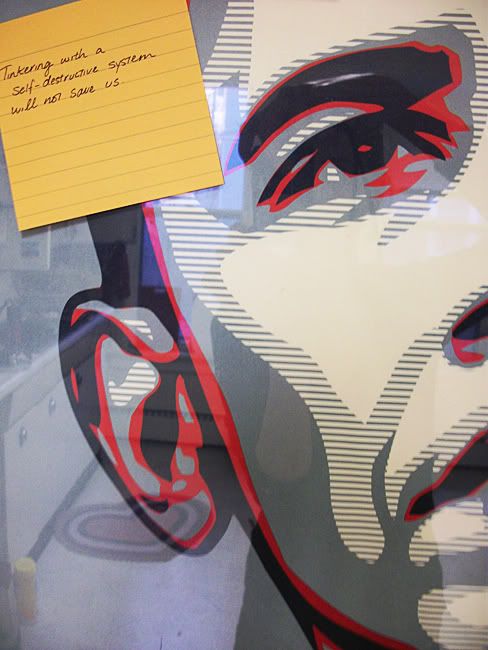
Monday, March 21, 2011
Sunday, March 20, 2011
Saturday, March 19, 2011
Jane Eyre.
I shall be called discontented. I could not help it: the restlessness was in my nature; it agitated me to pain sometimes.
JANE EYRE. CHARLOTTE BRONTE.
Tuesday, March 15, 2011
Monday, March 14, 2011
All we have left is the capacity to say "no."
Power Concedes Nothing Without a Demand
The liberal class is discovering what happens when you tolerate the intolerant. Let hate speech pollute the airways. Let corporations buy up your courts and state and federal legislative bodies. Let the Christian religion be manipulated by charlatans to demonize Muslims, gays and intellectuals, discredit science and become a source of personal enrichment. Let unions wither under corporate assault. Let social services and public education be stripped of funding. Let Wall Street loot the national treasury with impunity. Let sleazy con artists use lies and deception to carry out unethical sting operations on tottering liberal institutions, and you roll out the welcome mat for fascism. [ ... ] The liberal class has busied itself with the toothless pursuits of inclusiveness, multiculturalism, identity politics and tolerance—a word Martin Luther King never used—and forgotten about justice.
Workers in this country paid for their rights by suffering brutal beatings, mass expulsions from company housing and jobs, crippling strikes, targeted assassinations of union leaders and armed battles with hired gun thugs and state militias. The Rockefellers, the Mellons, the Carnegies and the Morgans—the Koch Brothers Industries, Goldman Sachs and Wal-Mart of their day—never gave a damn about workers. All they cared about was profit. The eight-hour workday, the minimum wage, Social Security, pensions, job safety, paid vacations, retirement benefits and health insurance were achieved because hundreds of thousands of workers physically fought a system of capitalist exploitation.
[ ... ] American democracy arose because those consciously locked out of the system put their bodies on the line and demanded justice. [ ... ] And American history, as Howard Zinn illustrated in “The People’s History of the United States,” is one long fight by the marginalized and disenfranchised for dignity and freedom. Those who fought understood the innate cruelty of capitalism.
The public debate, dominated by corporate-controlled systems of information, ignores the steady impoverishment of the working class and absence of legal and regulatory mechanisms to prevent mounting corporate fraud and abuse. The airwaves are saturated with corporate apologists. They ask us why public-sector employees have benefits—sneeringly called “entitlements”—which nonunionized working- and middle-class people are denied. This argument is ingenious. It pits worker against worker in a mad scramble for scraps. And until we again speak in the language of open class warfare, grasping, as those who went before us did, that the rich will always protect themselves at our expense, we are doomed to a 21st century serfdom. [ ... ] There is no liberal institution left—the press, labor, culture, public education, the church or the Democratic Party—that makes any effort to hold back the corporate juggernaut. It is up to us. The only place left for us is on the street. We must occupy state and federal offices. We must foment general strikes. The powerful, with no check left on their greed and criminality, are gorging on money while they busily foreclose our homes, bust the last of our unions, drive up our health care costs and cement into place a permanent underclass of the broken and the poor. They are slashing our most essential and basic services—including budgets for schools, firefighters and assistance programs for children and the elderly—so we can pay for the fraud they committed when they wiped out $14 trillion of housing wealth, wages and retirement savings. All we have left is the capacity to say “no.” And if enough of us say “no,” if enough of us refuse to cooperate, the despots are in trouble.
“Let me give you a word of the philosophy of reforms,” Frederick Douglass said in 1857. “If there is no struggle there is no progress. Those who profess to favor freedom and yet deprecate agitation are men who want crops without plowing up the ground. They want rain without thunder and lightening. They want the ocean without the awful roar of its many waters. The struggle may be a moral one; or it may be a physical one; or it may be both moral and physical, but it must be a struggle. Power concedes nothing without a demand. It never did and it never will. ...”
Sunday, March 13, 2011
Saturday, March 12, 2011
At stake here is a notion of democracy that refuses to be reduced to the dictates of a market society.
Ronald Reagan's infamous "it's morning in America" slogan, used as part of his 1984 presidential campaign, paved the way for a set of market-driven policies that historians faithful to the human record will be compelled to rename twilight in America to signal a historical crisis fueled less by a spirited hope for the future than by a shocking refusal to be held accountable to and for it. The policies that informed Reagan's neoliberal agenda have given way to the intense assault now being waged by his more extremist governmental descendants on all vestiges of the democratic state. This brutal evisceration includes a rejection and devaluing of the welfare state, unions, public values, young people, public and higher education; and other political, social and economic institutions and forces in American life that provide a counterweight against the political power of mega-corporations, the rich and the powerful.
In order to protect the interests of the wealthy and powerful corporations, the formative cultures, social formations and institutions necessary for a viable democracy are under a wide-ranging assault. The intensity and barbarism of such an attack is evident in the current right-wing attempts to dismantle crucial social safety nets, collective bargaining rights, unions and the regulatory constraints on powerful corporations. This conservative assault is not just about the enactment of reactionary government policies; it is also about the proliferation of a war at home, the collateral damage of which is harsh and brutalizing, especially for young people, the unemployed, the elderly, the poor, and a number of other individuals and groups now bearing the burden of the worst economic recession since the 1920s. But there is more at stake than an increase in the hard currency of human suffering; there are also disturbing signs that American society is moving toward an authoritarian state largely controlled by corporations and a financial elite.
As the public spaces for cultivating democratic values, critical citizens and compassionate social relations disappear, American society gives rise to an army of anti-public intellectuals, a powerful center-right media and cultural apparatus and a system of public and higher education, all of which largely function to undermine dialogue, dissent and critical thinking in American life. As politics is rewritten as a script to serve the rich and powerful, the democratic elements of social life are emptied out, along with an ongoing and well-financed conservative campaign to further sabotage those public spheres which enable a culture of questioning and modes of collective struggle to develop.
Politics has now become an extension of war, and the call to austerity a metaphor for a politics of disposability. With the collapse of the social state, those citizens viewed as disposable are now subject to a form of necropolitics in which the social contract, however inadequate, is viewed as a drain on government resources, and any notion of social protection is viewed as a pathological form of dependence. Complaints by right-wing politicians and conservative pundits about the growing federal deficit and their call for a harsh politics of austerity are both hypocritical and disingenuous: Hypocritical, given their support for massive tax breaks for the rich that will cost $850 billion for the next two years - more than the entire 2009 government bailout - and disingenuous, given their blatantly transparent goal of implementing a market-based agenda that imposes the burdens of decreased government services and benefits on the backs of the poor, young people, the unemployed, the working class and middle-class individuals and families. In this transparent scenario, austerity measures apply to the poor, but not to the rich, who continue to thrive under polices that produce government bailouts, support deficit producing wars, tax breaks for the wealthy and deregulation policies that benefit powerful corporations. The conservative and right-wing politicians and policy wonks calling for shared sacrifices made in the name of balancing budgets have no interest in promoting justice, equality and the public good. Their policies maximize self-interest; support a culture of organized irresponsibility; and expand the pathologies of inequality, military spending and poverty. Clearly, there is much more at stake in the current war against democracy than the right-wing ideological assertion that shared sacrifices have to be made in the name of balancing budgets. In a socio-economic climate marked by deep economic and social inequalities, the call for shared sacrifices and responsibilities translates in the hallowing out of social services, public spheres and educational resources that are vital to a democracy. Austerity in this script translates into an agenda that combines punishing policies with the elimination of the formative cultures and safety nets that make a decent life and political culture possible.
. . .
Democracy has become a ritual controlled by a small number of extremely wealthy individuals and corporate power mongers. And, yet, as the corporate and right-wing political stranglehold is tightened around the necks of the elderly, workers, young people and those marginalized by class and race, coalitions and the seeds of new social movements are taking shape in states across America and beginning to fight back. Workers, the elderly and young people are demonstrating in large numbers in Ohio, Wisconsin, Georgia, Montana, Tennessee, and other states against the assaults being waged on unions, public servants and the social state in the name of concentrated corporate and political power.(5)
Public service workers, young people, educators, and others who now occupy the liminal space of political resistance are once again struggling to make official power visible, especially in terms of the toll it takes on those who are viewed as excess, unworthy of government supports and often excluded from the benefits of a good life. At the same time, protesters organizing in Wisconsin and other cities are making clear the necessity to recognize that power is not entirely subsumed within a politics of domination, and that there is a growing and increasingly collective resistance to the assaults being waged on those marginalized by class, race, age and ethnicity. What is being learned from these struggles is that if democracy is to be reclaimed as a radical idea - "the idea that people can control the functioning of society [and that] people should make decisions about all the issues that affect them" - it is crucial for progressives and others to struggle to create those formative cultures that enable people to translate private injustices into social and systemic problems. At stake here is a notion of democracy that refuses to be reduced to the dictates of a market society. Such a view is crucial for those emergent social movements and struggles that suggest that democracy is once again being viewed as the "sharing of an existence that makes the political possible."
The current upsurge in collective resistance against the corporate state will succeed if it speaks to and connects with a broader crisis of public values, the eclipse of a democratic public spheres and the disappearance the social state. If the principles of democracy are not to be turned against themselves in order to further the savage assaults waged on the American people by advocates of casino capitalism, it is crucial that emerging social movements emphasize what the late Tony Judt called the raising of social questions through a language that stresses the importance of public goods, shared responsibilities and a language that connects private troubles with social considerations. Hopefully, what we will see from those fighting the nightmare in America is both a narrative of critique and possibility, one that attempts to recast the public conversation about memory as a condition for learning, higher education as a crucial public good, academics as public intellectuals, critical agency as a basis for social responsibility and democracy as the radical frame through which meaningful political struggle becomes possible once again. We don't need delusional appeals to Reagan's invocation of "morning in America" from those politicians who have become lackeys for the rich and corporate elite. On the contrary, we need justice in America, and that demands more than crowd-pleasing slogans. And that requires the kind of struggles that we see in Wisconsin, Ohio, and other states where the very principles, social relations and institutions that make for a viable democracy are under siege.
Monday, March 7, 2011
It is a radical act.
America's Radical "Conservatism"
Lawrence Davidson
Inescapable contradictions in modern 'conservatism': --The alleged right to possess unlimited numbers of deadly weapons.
For modern political conservatives obsessed with the issue of gun laws, this "right" to be over-armed supersedes the public’s need for a safe environment.
Thus, compared to the age-old tradition of public safety, the gun mania of today’s conservatives is absolutely revolutionary.
It certainly has nothing to do with the Constitution’s "well ordered militia" and does not reflect "habits that have proved useful in a huge variety of practical affairs." In fact, the only "habits" this obsession references are those displayed in fantasies that romanticize cowboys and military combat.
--The battle against legal abortion.
This modern political/social conservative cause also references fantasy rather than "a comprehensive and generally coherent point of view that reflects very extensive experience and thought." This is because the outlawing of abortion does not eliminate abortion. It simply drives it into the back alleys creating an ever greater risk to desperate and mostly poor pregnant women.
Thus, obsessed as they are with the rights of the unborn, these so-called conservatives care little for the much more traditional right of well-being for those who are "post womb." In addition, unwanted births put stress on the traditional family structure, increase rates of delinquency and deepen poverty.
--An obsessive fixation with taxes.
Those modern-day political conservatives who have this particular mania seem to be incapable of understanding that it is a radical act to advocate the reduction of taxation to the point of social ruination.
In order to spare their wallets and allegedly promote "individual freedom" they advocate, among other things, privatizing the public school systems, denial of services to indigent people, and elimination of state involvement in such issues as public health and environmental safety.
Sunday, March 6, 2011
You better watch him.
